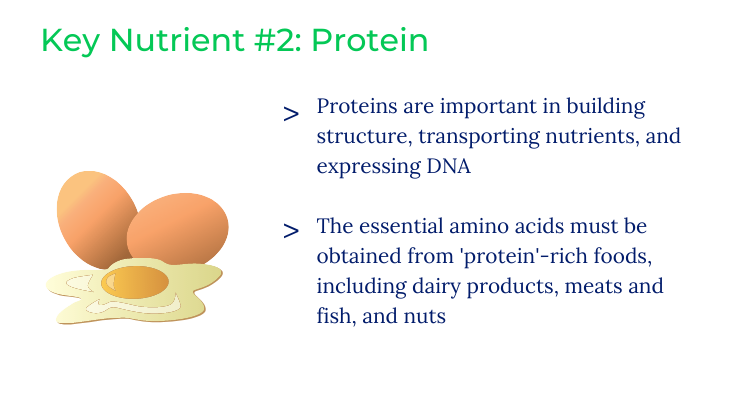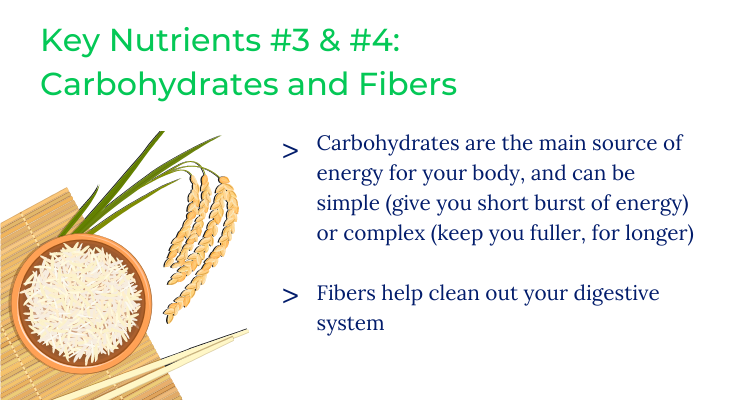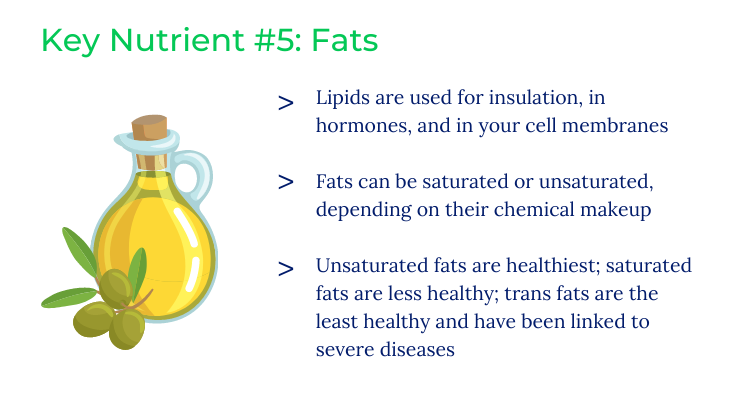What Does Your Body Need?
The human body is a complex and remarkable system. All organ systems in your body (assuming, of course, that you’re human) work together to allow you to live, walk, and even read this article right now.
In order to keep your body functioning properly, though, you need to get the nutrients your body needs to build tissues and perform its chemical processes. Proper nutrition is thus very important—it helps your body sustain itself.
There are seven key nutrients the human body needs in order to work and help you be your best self. These are water, proteins, carbohydrates, fats, minerals, vitamins, and fibers.
Nutrient #1: Water
You may not think of water as a nutrient, but that it is. The body needs water for almost all of its chemical reactions, and water constitutes up to 60% of the human body and 73% of your brain—so it’s really important. Every bodily system needs water, as it plays a major role in many chemical reactions. It is also a major component of blood plasma, account for about 90-92% of the fluid.

Nutrient #2: Protein
Proteins play an extremely important role in our lives. In fact, you could very well say we are defined by our proteins, since they’re the means through which our DNA influences every aspect of our body. Proteins have specific functions in structure (such as the proteins that make up your muscles) and transport (such as hemoglobin, which is responsible for transporting oxygen in your red blood cells). Some are even hormones.
Amino acids are the building blocks of proteins. There are 20 distinct ones, which are needed to produce all the proteins we need. However, the human body only makes about 12 of the 20 amino acids; the other 8 (the essential amino acids) need to be obtained from our diets—hence where the term “protein” as a food category comes from.
Foods that contain a good source of essential amino acids include meat, fish, and dairy products. Nuts and some plant-based foods also have proteins, though you must eat several different types of them to get all the amino acids you need. It’s important to get the essential amino acids regularly because the human body doesn’t store them (unlike fats and carbohydrates).

Nutrients #3 and #4: Carbohydrates and Fibers
Carbohydrates, commonly abbreviated as carbs, are the nutrients mainly responsible for giving us energy, since they’re the ones commonly broken down by our bodies to form ATP (the energy currency of our cells). The carbohydrates we eat can be simple or complex. Fruits, candies, and other glucose-rich foods contain simple sugars, which are quickly and easily broken down by the body (that’s why you get that quick burst of energy). Bread, millet, grains, and rice contain complex sugars and take longer to digest. Complex carbohydrates keep you fuller for a longer period of time than simple carbohydrates.
Carbohydrates also serve another important function: they’re sources of dietary fiber. Our digestive system can’t break down all complex carbohydrates. Cellulose (plant starch) is a good example of a carbohydrate we can’t digest. This doesn’t mean that plant fibers such as cellulose aren’t useful. In fact, they help clean out our digestive systems and ensure we have healthy intestines.

Nutrient #5: Fats
A common misconception around fats for people who haven’t taken biology class is that they’re harmful to your health. While the wrong types of fats can indeed cause damage, the right fats in the right amounts are essential to ensure your body works properly.
Fats (also referred to as lipids) play several important roles in your body. They provide insulation against cold, help your digestive system, form many hormones and chemical messengers, and can even help your body absorb some water-insoluble vitamins. Perhaps most importantly, lipids are key components of your cell membranes, allowing your body to function the way it does. Without fats or lipids, you wouldn’t be able to regulate water or nutrient intake, you would feel too hot or too cold depending on weather, and you wouldn’t be able to absorb some very important vitamins, leading to uncomfortable symptoms and problems.
Remember how I mentioned there are the ‘right’ types of fats and the ‘wrong’ types of fats? The distinction between ‘right’ and ‘wrong’—or, more appropriately, ‘helpful’ and ‘harmful’—stems from saturated and unsaturated fats. While these two groups aren’t good or bad in and of themselves, the amount you should consume of each varies greatly and can determine whether you experience the good or adverse effects of fats.
Chemically speaking, the difference between saturated and unsaturated fats lies in whether there are saturated or unsaturated bonds between carbon atoms in a chain. All fats consist of fatty acids, which are simply chains of carbon atoms bonded to hydrogen atoms and a few other types of atoms. The chemical bonds between the carbons determines whether each carbon (which can form up to 4 bonds) is bonded to the maximum number of hydrogen atoms it can bond to, or if it isn’t. In saturated fats, the carbon atoms are bonded to each other with single bonds, which means they are bonded to the maximum number of hydrogens they can hold—they are saturated with hydrogens. In unsaturated fats, at least two atoms in a carbon chain have a double bond, so there are some unsaturated (unmaximized) carbon atoms, making the whole fatty acid chain unsaturated.
Outside of chemistry, why are these two classes important? And what are the effects of the differences in carbon bonds and saturation levels?
Saturated fats are generally solid at room temperature, and unsaturated fats are generally liquid. This might not seem so important, but this difference in melting point has great consequences. A saturated fat will stay solid at body temperature once you’ve consumed it, so it can actually clog a coronary artery (blood vessel in the heart) and accrete plaque, which could lead to heart disease. An unsaturated fat, by contrast, will not clog because it is liquid at body temperature and thus more easily broken down in your small intestine. This is why unsaturated fats (usually plant-based substances, such as vegetable oil) are recommended over saturated fats (usually animal-based substances, like butter). In fact, unsaturated fats need to make up most of the fat in your diet.
There’s also a third class of fats (besides saturated and unsaturated): the trans fats. These are unsaturated fats to which extra hydrogen atoms have been added for longer preservation of the product. Trans fats are the most unhealthy and have been linked to several diseases, including certain cancers.
Try looking at the food labels on the food products in your house, or maybe do some research on the fat content of foods you eat often. What are the concentrations of saturated, unsaturated, and trans fats? Some answers might surprise you, and should probably inform how much of that food or food product you eat and how often.

Nutrient #6: Minerals
Minerals are generally defined as inorganic substances the body needs in small amounts. These include (most famously) metals like calcium, iron, potassium, and sodium.
- Calcium is a key component of bones and teeth. The body does not produce calcium, but bones do store it. If the body experiences a calcium deficiency—that is, if you don’t consume enough calcium—the body will get the calcium it needs by releasing those stores, leading to more brittle bones over time.
- Iron is used to make hemoglobin, the oxygen-carrier protein in red blood cells. An iron deficiency means your body doesn’t absorb enough oxygen, so you’ll have trouble breathing, walking, and doing physical activities.
- Potassium and sodium help your nerves, neurons, and muscles function. Deficiency can lead to serious health problems.
But what foods contain good amounts of these critical minerals? Try doing some research to find out.
Generally, dairy products have a good supply of calcium; leafy vegetables like spinach and kale, other vegetables like beet roots, and protein like meat and fish, are rich in iron; and potatoes, tomatoes, avocados, and other such foods contain potassium.

Nutrient #7: Vitamins
Vitamins are the organic substances your body needs—in small amounts, like minerals. They help various organs or bodily systems function properly, and often help in the absorption of minerals. Some common vitamins your body needs include:
- Vitamin D—helps bones grow and increases potassium and calcium absorption. Your skin cells can manufacture Vitamin D if exposed to sunlight, which is why spending at least some time (but not too much!) basking in sunlight is important.
- Vitamin K—needed for your blood to clot normally. Leafy vegetables like kale and collard greens are high in Vitamin K.
- Vitamin C—an antioxidant; also helps heal wounds. Common foods that contain Vitamin C are citrus fruits, like oranges and lemons. Together, vitamins and minerals (when consumed in the right amount) help your body with the minutiae of living.

Conclusion
Water, proteins, carbohydrates, fibers, fats, minerals, and vitamins are all key nutrients your body needs to grow, heal itself, and generally be healthy. All nutrients are equally important, and you need to make sure you get them all in your diet.
A question you might be asking is, how much of each do you need? What would a balanced diet look like for you?
The answer really depends on various factors, but also your body type. What usually works for someone your age might not actually work for you. Plus, a one-size-fits-all solution most likely won’t work because it might include foods you don’t like or exclude foods you like that would actually be good for you.
Here’s something that might be fun for you to do in your free time: research some foods that have the nutrients your body needs, such as the various types of minerals, and create a table to summarize that information. Then, select the ones that most appeal to you and design your own meal plan, a new dish for each day of the week. Make sure you get all the nutrients you need from your schedule. Once you’re confident in it, implement it and see if you feel any different—perhaps more focused or more energetic. Healthy eating that you design will stick around much longer than any schedule imposed on you.
Have fun with it and have fun taking care of your body!
Sources
Information
- “The Water in You: Water and the Human Body”: https://www.usgs.gov/special-topic/water-science-school/science/water-you-water-and-human-body?qt-science_center_objects=0#qt-science_center_objects
- For information on bodily systems/body chemistry:
- “10 Foods That Are High in Potassium”: https://health.clevelandclinic.org/10-foods-that-are-high-in-potassium/
- “20 Foods That Are High in Vitamin K”: https://www.healthline.com/nutrition/foods-high-in-vitamin-k#TOC_TITLE_HDR_3
- “Iron deficiency anemia”: https://www.mayoclinic.org/diseases-conditions/iron-deficiency-anemia/symptoms-causes/syc-20355034
- “Plasma”: https://www.britannica.com/science/plasma-biology
Graphics
All graphics were designed by Ace.
New to Pearson Online Academy? Learn More Here.
